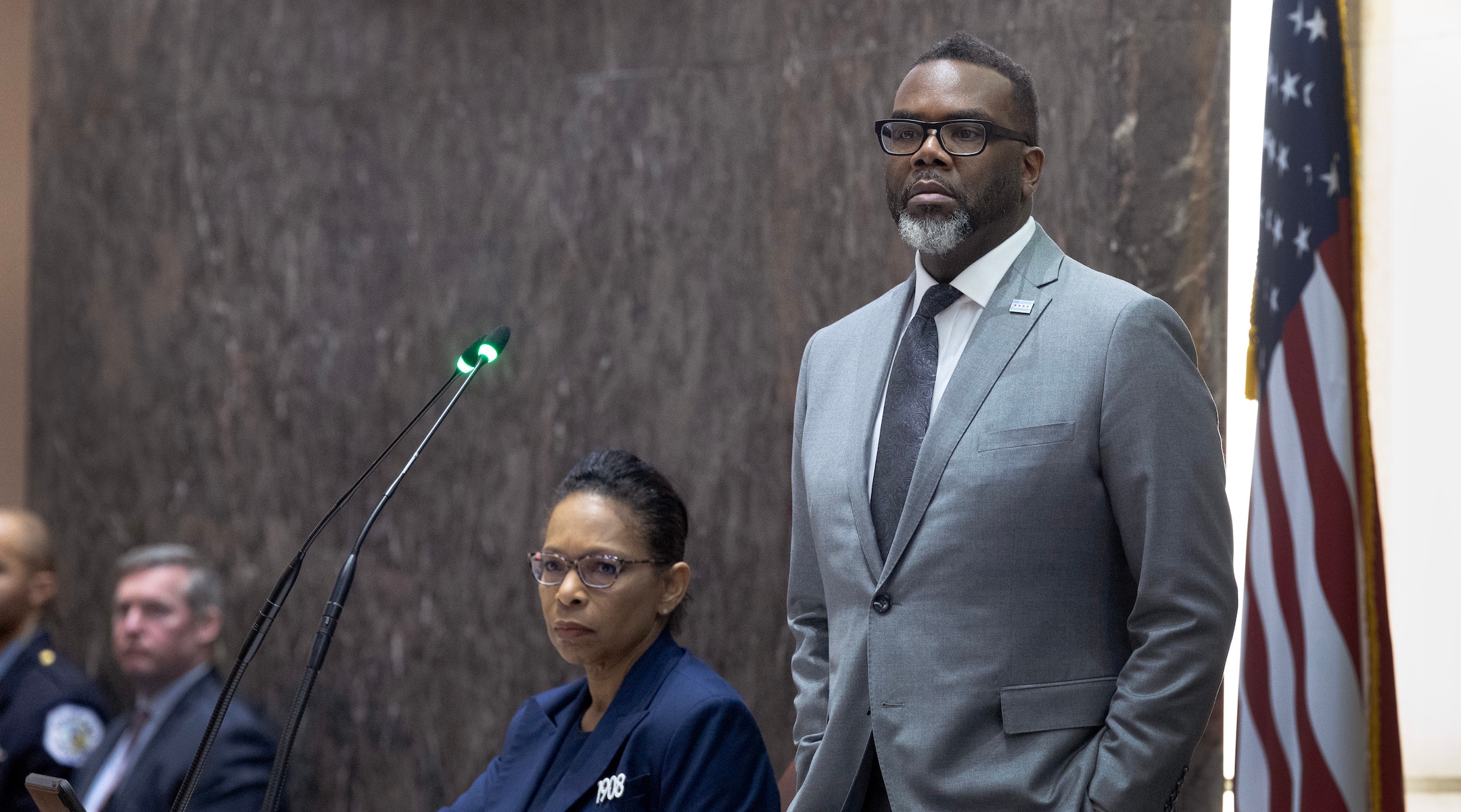Jewish mayor of Minneapolis issues veto, Chicago mayor votes yes in latest wave of ceasefire resolutions
Jacob Frey, the Jewish mayor of Minneapolis, criticized “a one-sided resolution that adds more division to an already fraught situation”

Minneapolis Mayor Jacob Frey listens during a press conference at the Department of Justice in Minneapolis, Minnesota, June 16, 2023. (Christopher Mark Juhn/Anadolu Agency via Getty Images)
(JTA) — Progressive mayors of two major American cities took opposite tacks Wednesday toward local resolutions endorsing a ceasefire in the Israel-Hamas war, a sign of enduring divisions between Democrats as the war is about to enter its fifth month.
Jacob Frey, the Jewish mayor of Minneapolis, vetoed his city council’s resolution endorsing a ceasefire, calling it “a one-sided resolution that adds more division to an already fraught situation.”
Hours later, Chicago Mayor Brandon Johnson cast the tiebreaking vote in favor of a ceasefire resolution in his own city council.
Both votes came as ceasefire resolutions have become a popular advocacy tool for pro-Palestinian activists, dismaying many American Jews and vexing Democrats.
A ceasefire may in fact be approaching: Negotiations are underway over an extended pause in the fighting, and Israeli proposals have called for a truce of a month or longer. But the wording of many of the resolutions has still given many supporters of Israel pause for appearing to favor the Palestinian perspective. Opponents of some resolutions also say they overlook the Oct. 7 attack by Hamas or the Israeli hostages it is holding in Gaza.
The resolutions will likely end up being adopted in both Minneapolis and Chicago. The Minneapolis council had passed its resolution last week in a 9-3 vote, a margin wide enough to override Frey’s veto, which was largely symbolic.
In a statement, Frey said, “I support a ceasefire. I support a return of hostages. I support a two-state solution.”
But he said the council’s resolution, which calls for a “permanent ceasefire” and references “the context of the 75-year displacement of Palestinians,” was not balanced because it “uplifts the history of Palestinians, and all but erases that of Israeli Jews.”
Citing local criticism of Jews for actions taken by Israel, Frey added that “I too have personally felt the rise of antisemitism in the city I love.”
The Minneapolis resolution inveighs “against the rise of and all acts of racially motivated violence and hate crimes.” It also calls for the release of the hostages in Gaza as well as Palestinians who are in Israeli prison without trial.
Frey’s veto was praised by the Jewish Community Relations Council of Minnesota and the Dakotas, which called the resolution “divisive.”
“We support the Mayor in his call for a resolution that will bring the city together behind a unifying message of ceasefire, return of all Israeli hostages held by Hamas, support for a two-state solution, and humanitarian aid to Gazans,” the council said in a statement.

Chicago Mayor Brandon Johnson presides over a city council meeting as lawmakers discuss a symbolic resolution calling for a ceasefire in the war between Israel and Hamas, Jan. 31, 2024 in Chicago, Illinois. The resolution passed by a vote of 24 to 23 after Johnson cast the tie-breaking vote. (Scott Olson/Getty Images)
Meanwhile, Johnson’s vote was decisive in Chicago, where the city council was divided 23-23 on its ceasefire resolution. The vote made Chicago the largest U.S. city to call for a ceasefire since the beginning of the war, joining a growing list of other cities including San Francisco, Atlanta, Detroit, Albany and Seattle.
The Chicago resolution calls for an “immediate humanitarian ceasefire” and was modeled after a non-binding version passed in December by the United Nations General Assembly and opposed by the U.S., Israel and a handful of other countries.
The resolution also calls for “the immediate and unconditional release of all hostages.” It was backed by several major unions in the city. It does not explicitly call for the release of hostages held by Hamas.
Johnson had endorsed a ceasefire last week. “At this point now, I believe we’re looking at 25,000 Palestinians that have been killed,” he said at the time. “The killing has to stop. So, yes, we need a cease-fire.”
In a joint statement, the Jewish United Fund of Chicago and the regional chapter of the Anti-Defamation League criticized Johnson and the city council for the resolution, which they said “divides our city, emboldens Hamas, and dangerously undermines U.S. global influence.”
“Since this resolution was introduced, we have tracked an increase in antisemitic incidents across the city,” the statement continued. “Protest after protest in Chicago has celebrated violence against Jews and crossed the line from legitimate criticism of a government to unfiltered hatred of Jews.”
The Israeli Consulate General to the Midwest, which is based in Chicago, also condemned the resolution as “polarizing” and said it would “inspire more antisemitism.”
The votes were contentious in both cities. In Minneapolis, hundreds of protesters turned out last week to advocate both for and against the council’s resolution, and the council voted down an alternate text that eliminated perceived pro-Palestinian historical references.
One protester’s sign, reading “U.S.A. is Occupied by Zionists more Than Palestine,” was visible behind a council member’s public address supporting the resolution. Frey mentioned that incident in his statement, connecting it with the reported rise in antisemitism.
In Chicago, Johnson ordered the council chamber cleared after repeated disruptions from rowdy protesters. It was a repeat of sorts of a scene from Oct. 14, a week after the Hamas attack, when Johnson cleared the chamber amid protests ahead of a vote on a resolution supporting Israel. That resolution passed without a roll-call vote.
Last week, when the Chicago resolution was still awaiting a vote, the council’s lone Jewish lawmaker was heckled by pro-Palestinian protesters while introducing a bill commemorating International Holocaust Remembrance Day.
That official, Alderperson Debra Silverstein, represents a heavily Jewish neighborhood and had introduced the Oct. 14 pro-Israel resolution. This time, she was unsuccessful in pushing the council either to soften the wording of the ceasefire resolution or include more criticism of Hamas.
Ceasefire resolutions continue to gain momentum in multiple arenas. The American Federation of Teachers, the second-largest teachers union in the country, also this week approved a resolution calling for a “negotiated bilateral cease-fire” — effectively what Israel, Hamas and their interlocutors are discussing.
The municipality of Hayward, California, has gone further and voted to divest from major companies with connections to Israel, in a sign of support for the Boycott, Divestment and Sanctions movement. Ceasefire resolutions have also failed in cities including Burlington, Vermont, and East Lansing, Michigan.
This article originally appeared on JTA.org.














